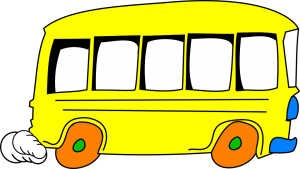
When thinking about bus rhymes for children, there’s only one that comes to mind. I’m sure nearly every family in the world is familiar with the age-old verse, “The Wheels On The Bus.” But have you ever pondered over the origins of the song? Is there really any educational value to the song? Is there a story behind it? Stick with me, and we’ll go over every fact about the bus!
Who wrote it?
There is no concrete proof of who wrote “The Wheels On The Bus,” but Verna Hills of Boston, Massachusetts, is credited for the work. Her name was associated with the songs first ever published appearance in volume 25 of “American Childhood.” This volume was released by Milton Bradley in 1939.
Why was it written?
Unfortunately, since the author cannot be proven with certainty, neither can the exact reason for its creation. Many believe that the rhyme exists so that children can have some entertainment while on long bus rides. This idea is considered to be true because “The Wheels on the Bus” only surfaced when the capacity for the motorized school bus increased, which made for longer routes and more time spent riding to and from school.
Have there been any changes since it surfaced?
Yes, there has! The original verse includes features of the bus such as the wheels going round, the wipers going swish, the horn going beep and, the people moving up and down. Since it’s origins the features have grown to include the doors opening and shutting, the driver going “move on back,” the baby going “wah” and the mommies or parents on the bus going “Shh.”
What does “The Wheels on the Bus” teach?
I believe the rhyme is so repetitive because it’s helping the children remember the lyrics, first and foremost, which allows them all to more easily sing it as a group. There are also plenty of opportunities to get children up and moving with this rhyme as hand movements could easily be added or choreographed into a dance routine for a younger classroom. All these things promote inclusion, which I believe to be essential for a child’s self-esteem.
Are there any hidden meanings?
As with many other children’s rhymes, there are theories out there about it’s hidden meanings, either that it is secretly anti-capitalist, anti-religion or anti industrialist. However, one can safely assume that this particular rhyme was inspired by the mundane actions of the bus, merely to keep our children entertained on their journey to and from us every day.
What do you think? Do you see any hidden message in the lyrics to “The Wheels on the Bus” or is it merely a way for our little ones to pass the time. There are some interesting theories out there on the web, but I for one like to think of this rhyme as an innocent pastime, rather than a malicious tune to infiltrate the minds of our youth.